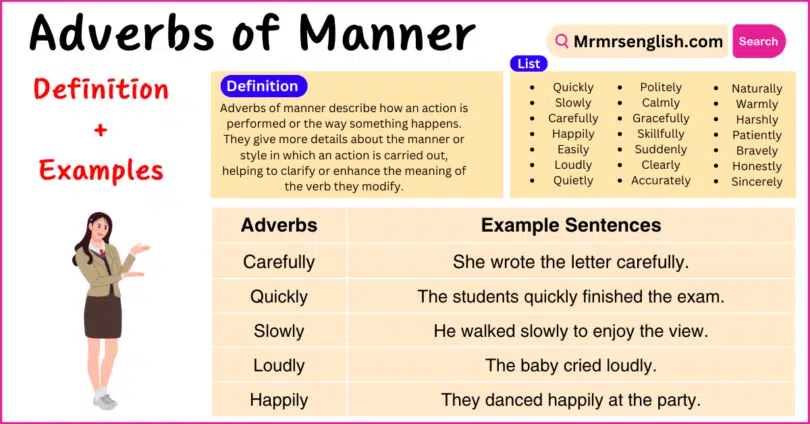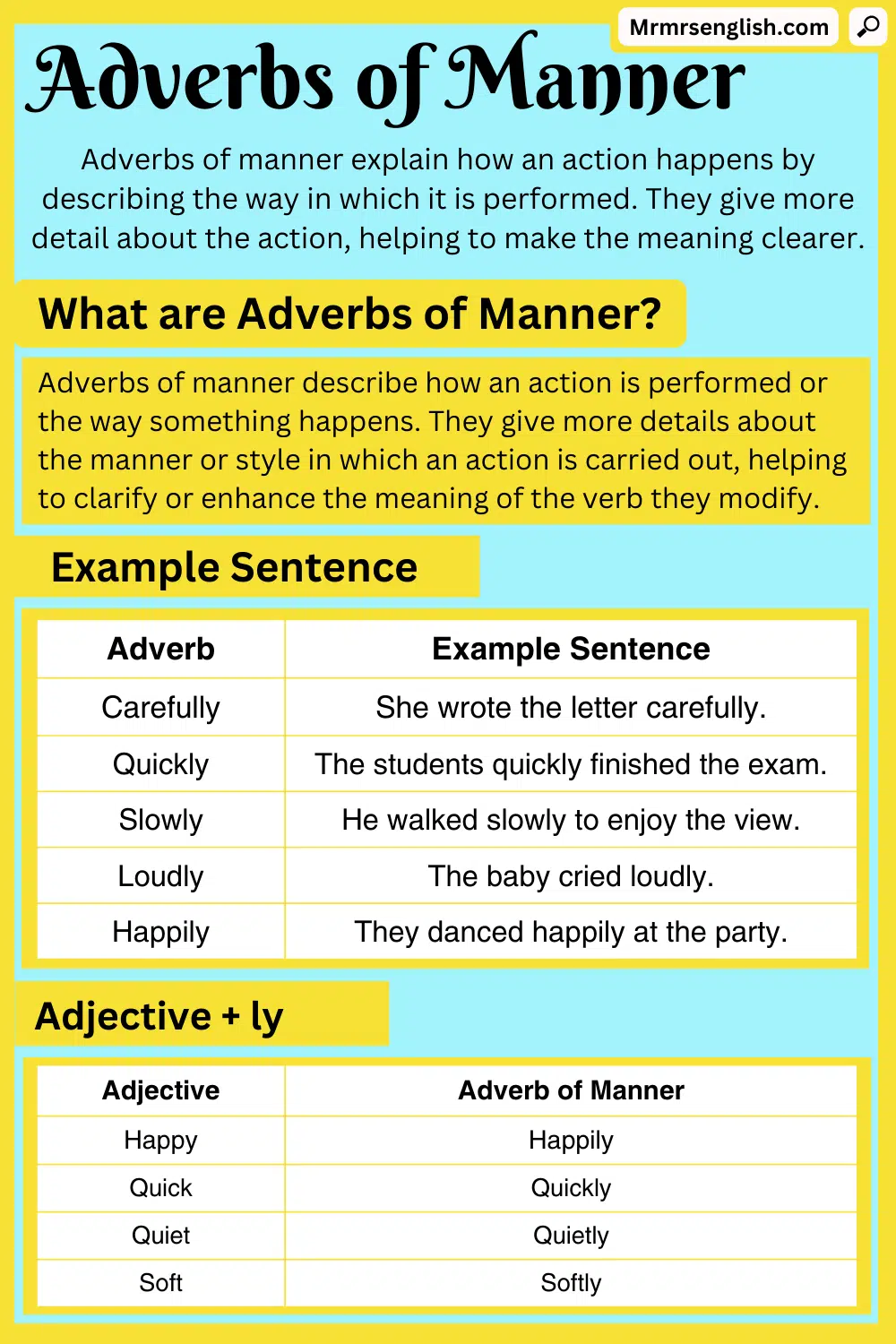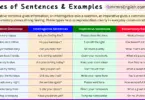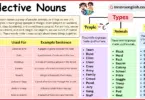What Are Adverbs of Manner?
Adverbs of manner describe how an action is performed. They add details to verbs, giving the listener or reader a better understanding of the situation. These adverbs usually answer the question “how?” and are often formed by adding -ly to adjectives, though this is not always the case.
For example:
- He quickly finished his homework.
- She spoke softly to avoid waking the baby.
How to Identify Adverbs of Manner
Adverbs of manner often appear right after the verb or at the end of a sentence. They modify the verb by providing extra information about the way the action takes place. In English, most adverbs of manner are formed by adding -ly to adjectives, though some remain the same as the adjective.
Here is a simple formula to recognize them:
Formula:
Adjective + -ly = Adverb of Manner
| Adjective | Adverb of Manner |
|---|---|
| Happy | Happily |
| Quick | Quickly |
| Quiet | Quietly |
| Soft | Softly |
However, not all adverbs of manner follow this rule. Some irregular forms remain the same as the adjective, like fast and hard.
Common Adverbs of Manner in English
Here’s a list of some of the most commonly used adverbs of manner:
| Adverb | Example Sentence |
|---|---|
| Carefully | She wrote the letter carefully. |
| Quickly | The students quickly finished the exam. |
| Slowly | He walked slowly to enjoy the view. |
| Loudly | The baby cried loudly. |
| Happily | They danced happily at the party. |
| Easily | She solved the puzzle easily. |
| Gently | The wind blew gently through the trees. |
Placement of Adverbs of Manner in Sentences
1. After the verb
- Example: She sang beautifully.
2. At the end of a sentence
- Example: He closed the door quietly.
3. Between the auxiliary verb and the main verb
- Example: They have quickly decided to leave.
Note: The placement of adverbs can sometimes change the emphasis or meaning of a sentence. For instance:
- She spoke loudly to be heard. (focus on how she spoke)
- She loudly spoke to be heard. (focus on the action of speaking)
Forming Adverbs of Manner: Regular vs. Irregular Forms
Regular Adverbs of Manner
As mentioned earlier, regular adverbs of manner are typically formed by adding -ly to the base adjective.
Examples:
- Quiet → Quietly
- Happy → Happily
- Careful → Carefully
Irregular Adverbs of Manner
| Adjective | Adverb |
|---|---|
| Fast | Fast |
| Hard | Hard |
| Late | Late |
| Early | Early |
Examples in sentences:
- He runs fast. (The word “fast” acts both as an adjective and an adverb.)
- She works hard every day.
Advanced Use of Adverbs of Manner
As students advance in English, they learn that adverb of manner can also combine with other adverbs or prepositions to create more complex meanings.
Combining Adverbs of Manner with Other Adverbs:
- He completed the task quite quickly.
- She sang very beautifully at the concert.
Adverbs of Manner and Prepositional Phrases:
Adverbs of manner can also be combined with prepositional phrases to offer more specific details.
- He ran quickly across the street.
- She spoke softly in the room.
Adverbs of Manner Example Sentences
| # | Example Sentence |
|---|---|
| 1 | She sings beautifully. |
| 2 | He ran quickly to catch the bus. |
| 3 | They spoke politely to the guests. |
| 4 | The baby slept peacefully. |
| 5 | He answered the questions clearly. |
| 6 | The dog barked loudly. |
| 7 | She walked gracefully across the stage. |
| 8 | He worked carefully on the project. |
| 9 | She smiled happily at her friend. |
| 10 | They handled the situation calmly. |
| 11 | He spoke softly to avoid waking the baby. |
| 12 | The students listened attentively. |
| 13 | She danced elegantly at the party. |
| 14 | He drove recklessly on the highway. |
| 15 | The artist painted skillfully. |
| 16 | The teacher explained the topic patiently. |
| 17 | She laughed loudly at the joke. |
| 18 | He replied rudely to the question. |
| 19 | The athlete trained hard every day. |
| 20 | They finished the task easily. |
Learn Also:









Leave a Comment